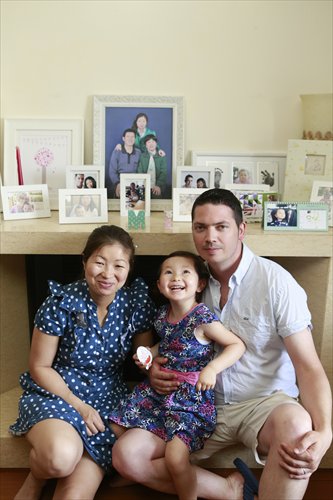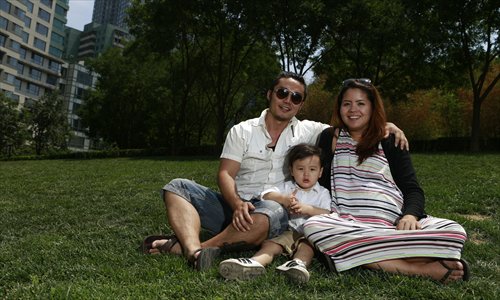When a child has parents from different countries, choosing a nationality can be a challenge

Peter Jones, a Brit, and his Chinese wife decided on Chinese citizenship for their three-year-old daughter. While they were motivated by its advantages, a Chinese passport also limits the educational options for their daughter. Photo: Li Hao/GT
Sending your kids off to school for the first time is usually a joyous landmark for parents, but for 32-year-old Brit Peter Jones and his Chinese wife, it looms as a source of growing dread. That's because the start of school for their daughter Mia, who turns four in August, will mean facing some tough choices regarding nationality.
When Mia was born, the couple had the option of choosing either Chinese or UK citizenship for their daughter, since China doesn't allow dual citizenship. In the end, they chose to register her as Chinese because they had no imminent plans to leave China, and they thought that having Chinese nationality would make things easier for her in terms of everything from childhood documentation to finding a job or buying property once she grew up. They figured that Mia could decide when she was older whether to keep her Chinese citizenship or to renounce in favor of UK citizenship, Jones said.
Yet school has presented an unexpected challenge to their plan.
"We are giving serious thought to renouncing her Chinese citizenship. My daughter starts primary in two years and there are very limited options for international schools that accept Chinese students," said Jones, who is a director at Gembryo Schools, a chain of Beijing-based kindergartens. Mia currently attends school at the Tongzhou campus.
Jones and his family are not alone - the question of nationality is an ongoing struggle for many cross-cultural families living in China. Citizenship for the children of international couples is not just a question of identity, it's one of schooling, healthcare, travel - in short, of their future.

Jessica Johanna Suotmaa and her Chinese husband decided to have their son follow her in dual US-Finnish citizenship, because she thought that it would offer benefits related to healthcare and social welfare. Photo: Li Hao/GT
Why choose Chinese citizenship?
Jones recalls that back in 2012 when Mia was born, they spent a long time debating the pros and cons of UK and Chinese citizenship.
While they knew that a UK passport would open more doors for Mia in terms of international opportunities, they also realized the less tangible implications of their choice - namely how either nationality would affect her sense of identity. As the couple had no plans to return to the UK, they figured that Chinese citizenship would be the best option in terms of helping Mia feel that she belongs.
"She was born in China, lives in China and is of Chinese heritage," Jones said.
"It was obviously a concern about how it would affect her psychologically. If we got her a UK passport, she would be regarded as an outsider when she became an adult in China."
The choice also made sense on a practical level. As the UK recognizes dual citizenship, Mia could apply for a British passport at any time. But once she renounces her Chinese citizenship, it is lost forever.
Jones reckons that the benefits of Chinese citizenship will become more apparent when Mia is an adult and begins establishing herself financially. As a foreigner, her job prospects in China would likely be limited, and access to credit cards and house loans would be all but impossible, he said.
Jessica Johanna Suotmaa, an editor of Beijing Kids, said that out of the many mixed couples she knows, some opt for Chinese citizenship for their children to save money and hassle, while others want their children to be able to "choose" their identity at the right age.
"Taking Chinese citizenship means that they can qualify for lower cost healthcare, local schooling, and let's not forget saving on visa costs," said Suotmaa.
The dilemma of choosing Chinese nationality
Despite the benefits brought by Chinese citizenship, it does present some challenges, like with schooling or applying for documents to travel abroad.
While Jones and his wife are happy with the kindergarten that Mia currently attends, their options will narrow once she begins primary school in a couple of years.
"Because of [her citizenship], I cannot send her to a school like The British School of Beijing," said Jones. "There are not many good quality international primary or high schools that enroll Chinese nationals in Beijing."
Traveling abroad also presents challenges. As the summer holidays approach, Jones and his wife are beginning their annual tradition of applying for visas so that they can visit Jones' family in the UK. Since Mia is only eligible for a six-month visa to the UK, they must renew it each year.
"If we also want to visit Europe, we have to apply for a separate Schengen visa. It just doubles the inconvenience," said Jones.
Still, this is nothing compared to the hassle that Frank Smith (pseudonym), a Canadian international school teacher who married a Chinese woman, has encountered in trying to travel internationally with his wife and daughter.
The family initially planned on living in China until their two-year-old daughter Sophie, who was born in Beijing, completes primary school.
As such, they decided that it would make the most sense for Sophie to hold Chinese citizenship.
All was going according to plan until they recently visited the Canadian Embassy to get her a visa to travel to Canada.
"The Canadian Embassy in China told us that since Sophie was born, she was automatically seen as a Canadian by the Canadian government, so they would not issue her a visa," said Smith.
Smith and his wife had initially assumed that Sophie would be eligible for Canadian citizenship, but would have to apply for it. But the Canadian government told them that she is automatically considered a citizen.
However, if she doesn't apply for a Canadian passport before she turns 18, the government will revoke her citizenship.
The problem is that, without a visa to Canada, it would become obvious to the Chinese government that Sophie also holds Canadian citizenship, which is illegal for her as a Chinese passport holder.
"Many Western countries like Canada and the US have citizenship through birth (birthright citizenship), so many parents face the same situation," Smith said.
The couple were initially told by officers at the public security bureau in the hometown of his wife that in order to obtain the necessary permit for Sophie to exit the country legally, she would need to renounce her Chinese citizenship, which would mean losing all the benefits that go along with it. But after Smith and his wife visited government offices a number of times to negotiate with the officials there, the family succeeded in obtaining the permit from the public security bureau without having to cancel her citizenship.
According to the official website of the Beijing Public Security Bureau, children with "nationality conflicts" are not allowed to leave China on a Chinese passport, but must apply for a one-time Entry-Exit Permit.
"Though China doesn't allow dual citizenship, some still exist in this gray area in which they have two nationalities, Chinese and another one. But it's illegal, so if they get caught, they have to go through the process of choosing one, which can take a long time," said Suotmaa.
Opting for a foreign passport
Other parents prefer opting for foreign citizenship due to the legal and social welfare benefits that some countries provide.
One example is Suotmaa, a dual US-Finnish citizen, who married a Chinese man in the US in 2008. They settled in Beijing in 2013 as her husband wanted to develop his career in China. The couple decided that their Finnish-born son Jax would also have dual US-Finnish citizenship.
Suotmaa, who is eight months pregnant now, recently flew to the US to prepare for the birth of their second child.
"For my children, it's easier to travel with them to visit my family if they have the same passports as I do and require fewer visas," said Suotmaa.
"The health and social benefits, including education in both Finland (which has one of the most extensive social welfare systems of any country in the world) and the US are also superior to the benefits offered in China."
For example, in the US, she can get her children immunized without having to worry about the kinds of dangers that were exposed by a recent scandal in China, in which clinics were found to be using expired vaccines.
Suotmaa and her family plan to stay in Beijing for another two or three years, at which point Jax will be ready for pre-school.
"At that time, we will need to re-examine our careers and whether we can afford a good international school education. Moving back to the US is also a possibility. Everything is still up in the air now."
How to make a choice?
Suotmaa thinks that the most important considerations related to choosing a child's nationality is how long the family plans to stay in China, as well as how powerful the passport of each nationality is.
"There's actually a world ranking for this. If the other citizenship is not beneficial for a child, then it's unnecessary to choose it right away since most countries allow children to 'choose' a nationality before they turn 18," said Suotmaa.
Smith said he thinks that besides visa issues, the biggest issue to consider is whether the child will go to school in China and what kind of school you send them to.
For instance, he said, parents who want their children to attend very good Chinese schools, such as the elementary school affiliated with Renmin University of China, should consider opting for Chinese nationality.
Smith added that children who are in citizenship limbo - who hold a foreign passport but have not renounced their Chinese citizenship - will not be granted visas to China, which is a requirement for enrollment in most international schools.
Jones said that it's best not to rush into renouncing Chinese citizenship unless it is absolutely essential.
"Many parents do not know that they will face a lot of problems no matter which way they go. I think they should at least commit to a basic plan for the first five years of their child's life in order to build a solid and stable foundation including where you will live, childcare arrangements and so on," said Jones.
Jones and his wife are currently looking forward to the birth of their second baby, for whom they also plan to apply for Chinese citizenship.
Though they're already aware of the difficulties this could present when their kids get older, they've decided to commit to a path, and take the consequences as they come.
Newspaper headline: Citizens of the world